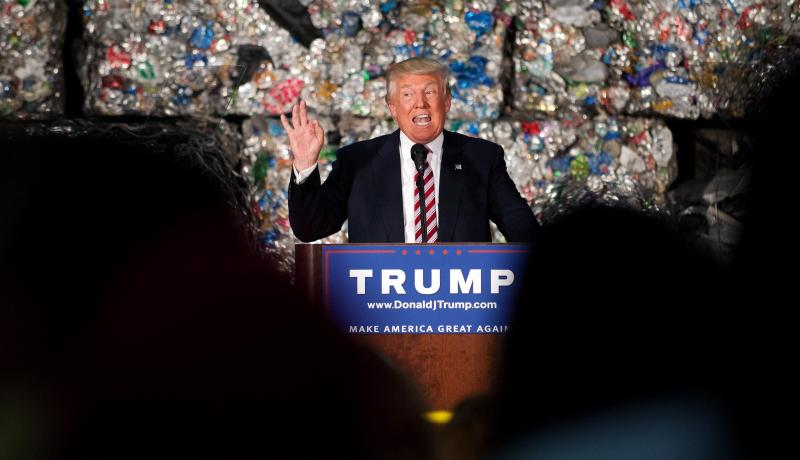
With Donald Trump in the White House, US trade policy will probably look very different from the past 70 years - seven decades across which successive Republican and Democratic administrations have participated in and led global trade liberalization initiatives. If the president-elect delivers on his major campaign promises on trade, the negative effects on the American economy would be severe and the United States would give up its role in shaping the global trading system.
But there is no need to panic. Trump will likely leave behind the rhetoric of the campaign trail once he sits in the Oval Office. Trump will probably moderate his proposals, because a faction of the Republican-dominated Congress continues to support free trade. He might also be reined in by his team, though that depends on who best catches the ear of the president: individuals such as Vice-President-elect Mike Pence, who has supported free-trade agreements in the past, or trade-skeptical advisors such as Dan DiMicco, who now heads the transition team for the Office of the United States Trade Representative.
So what does the Trump presidency actually mean for trade?
Trump won’t likely follow through on his most extreme plans, such as leaving the World Trade Organization. But he will lead a more protectionist United States that focuses on its trade deficits – with particular attention being paid to China and Mexico. Trump will probably impose tariffs on imports from those countries; however, duties will be lower than the mooted 45 per cent and 35 per cent, respectively. With regards to China, Trump will probably bring trade cases against Beijing’s subsidy arrangements and look into alleged currency manipulation (even though most economists accept that the renminbi is no longer undervalued).
Given the prominence of the North American Free Trade Agreement on the campaign trail, Trump will have to address the deal with Canada and Mexico. Whether that means renegotiating or pulling out remains to be seen. One thing is certain: Trump will not move forward with mega-regional trade accords such as the Trans-Pacific Partnership or the US-EU Transatlantic Trade and Investment Partnership. Those would-be pacts are a lost opportunity, but this is not the end of the trade world. Trump will focus instead on striking trade deals with individual countries. One such potential bilateral trade deal could be a US–UK agreement, which Trump and his advisers, despite the prognostications of the current president, see at the front of the queue.
Opportunity to rethink the trade framework
The fact that Trump is not necessarily against free trade per se bears hope. And there is another silver lining in the dark cloud hanging over trade. Trump has pointed to some valid concerns about the current trading system. His victory can be an opportunity to address these shortcomings.
NAFTA does need an update. The agreement entered into force in 1994 - before the internet took off. Thus, provisions to include standards to protect digital freedoms could modernize NAFTA and expand its scope to cover 21st century economic issues. In addition, labour rights and environmental protections were not included in NAFTA but were incorporated into side agreements with weak, unenforceable provisions. By better addressing labour and environmental issues, NAFTA could be significantly upgraded.
Trump will aim to tackle unfair competition and look to enforce existing trade deals more vigilantly. This is another important and legitimate issue, and could be tackled in conjunction with European allies. The European Commission has recently proposed redesigning and updating its trade defence instruments because non-market economy practices and state intervention by some WTO countries - for example, China’s overcapacity in the steel sector - have hurt domestic industries. Without action by major players such as the United States or the European Union, China would have no incentive to reform its distortionary policies. Trust in the rules-based trading system requires that existing trade agreements are properly and fairly enforced.
Trump’s win highlights the need for better compensation for those who have felt the adverse effects of trade. His victory was partly fuelled by tapping into economic anxieties and appealing to voters who feel left behind by globalization. Better mechanisms to cushion the blows to the losers of globalization are indeed required. In the United States, Trade Adjustment Assistance has been insufficiently funded and is ineffective. More needs to be done to replace the wages of workers whose jobs have been lost due to trade and to provide them with skills training for re-employment. This reconsideration of assistance for those who are hurt by free trade could provide a foundation for the future. Once the current wave of anti-trade sentiment subsides, new trade agreements can be struck that don’t leave so many citizens feeling left behind.
Instead of worrying about how Trump might blow up the underpinnings of the global trading system, this is an opportunity to rethink what a new trade framework might look like.
This piece was published in collaboration with Real Clear World.
Marianne Schneider-Petsinger is geoeconomics fellow in the US and Americas Programme, responsible for analysis at the nexus of political and economic issues.
